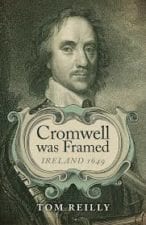In 2001, Tom Reilly published a book called Honourable Enemy, which sought to vindicate Oliver Cromwell from the charges of war crimes against the civilian population of Ireland during his campaign there in 1649. The principal accusations come from his siege and capture of the cities of Drogheda and Wexford.
That book set up a howl among the learned, and Reilly was roundly attacked for questioning “what everybody knows.” The uproar was considerable, especially in Ireland, “where history has an irritating habit of not going away” (p. 7). As Faulkner once put it, apropos of another situation entirely, “The past is never dead. It’s not even past.”
I have Honourable Enemy on my shelves, and hope to get to it at some point in the gloaming of my years. But I decided to read this book first, Cromwell Was Framed, in order to get to the interaction between Reilly and his critics.
“The first casualty when war comes is truth.” This is purported to have been said by Sen. Hiram Johnson of California in 1918. Samuel Johnson expressed a similar sentiment — “Among the calamities of war may be jointly numbered the diminution of the love of truth, by the falsehoods which interest dictates and credulity encourages.’ Not many of us knew that Johnson (either Samuel or Hiram) knew anything about Facebook in wartime.
Regardless of who made this observation first, the reality has been with us as long as war has been. A basic tactic of warfare has always been to lie about what the enemy is doing, and about what you have done, etc. After the Restoration of the monarchy, the allegations about Cromwell in Ireland began to be firmly established. But how we got to that point is really interesting.
What Reilly does in this book — and it is fascinating — is to publish facsimiles of the earliest (contemporary) publications that discussed Cromwell’s exploits in Ireland. He surrounds these facsimiles with his own commentary, along with some modernized reprints of the facsimiles (which are difficult to make out in places). The hinge of the controversy lies with the phrase “and many inhabitants” that was inserted in one of those publications. Who inserted it, and why?
For myself, I find Reilly convincing, and do not think Cromwell a hypocrite or war criminal. But at a bare minimum, I believe Reilly shows that this is an open question. This is the kind of book that every history teacher should get and read. It demonstrates how easily something that is highly debatable can nevertheless become the “received consensus,” get plonked into textbooks for the kids, and shortly thereafter become a Fact.
This book is highly recommended, but with one caveat. Some of the layout makes it difficult to follow at places. Still very much worth your while.



Hey! History is “settled”, just like “science”!
You should be expecting a visit from the Commissar, Wilson! ????
The Mitch Stokes interview attracted my attention to this site and while there I found this about how to lie with TV, which is relevant to the current discussion. Then there was this interview with the author of The Lost World of Adam and Eve. I’d love to see you review his stuff.
Here’s a revealing quote from The Lost World of Adam and Eve: “anthropological evidence for violence in the earliest populations deemed human would indicate that there was never a time when sinful behavior was not present … that even though any human population possibly preceding or coexisting with Adam and Eve may well have been engaged in activity that would be considered sin, they were not held accountable for it … the sin of Adam and Eve would be understood as bringing sin to the entire human race by bringing accountability” (pg 154) It seems that the author does not… Read more »
I am sure that you will not be recommending Reilly’s autobiography where he explains how becoming an atheist was wrapped up in his investigations into Cromwell. Of course, this does not necessarily mean that he is wrong about Cromwell. However, as you pointed out a couple of days ago, “making feelings foundational to all arguments” is a bad idea. It is clear from Reilly’s writing that he is very emotional about his topic, and that those emotions are inextricably linked to his atheism. Here are two level headed reviews of the book from The Irish Times and The Catholic Herald.… Read more »
John You make some good points here. I think if Doug read Reilly’s autobiography he would be struck by his savage use of expletives (throughout the book) which he directs at his religious educators. I read Reilly’s take on Cromwell some years ago and was initially impressed – but then read his autobiography and have to say I was shocked by the liquid hate pumping through his veins. It immediately occurred to me that what Reilly was doing was attempting to get one back on the Catholic teachers of his youth, for whom he reserves such bitterness and disdain, by… Read more »